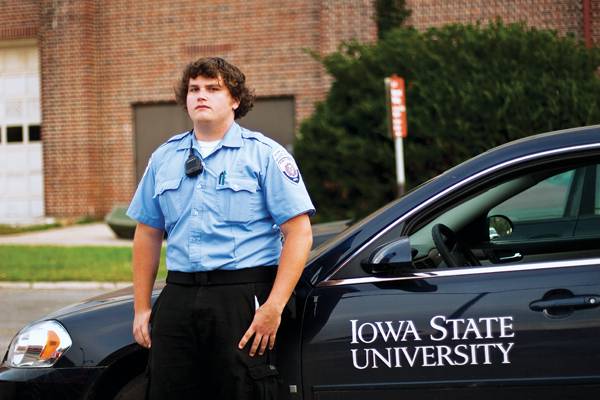Safety escort for students

Justin Koenen, junior in construction engineering is a student officer for the Escort Services on campus, Monday, September 14, Armory Hall. Students usually request for escort services late at night or when the weather is bad. Photo: Karuna Ang/Iowa State Daily
September 13, 2009
Demand for Iowa State’s Safety Escort Service has risen steadily in the past four years, but resources remain at their previous levels.
The Safety Escort Service is run by student employees of both the police and parking divisions of the ISU Department of Public Safety.
Jerry Stewart, director of the Department, said the divisions rotate safety escort duties to “equalize the workload and decrease the response time.”
The service, free to anyone on campus, operates from 6 p.m.–6 a.m. on days classes are in session.
Vehicle escorts are done by the HelpVan and an unmarked police car while golf carts and walking escorts are also used on occasion, Stewart said.
Stewart admitted the biggest challenge to the program: “We do not have, at this time, student staff dedicated to escorts,” he said.
Stewart explained that police division employees are responsible for locking outlying buildings, along with other security duties, which prevents them from being solely dedicated to the escort function. In addition, the HelpVan is responsible for both motorist assists and safety escorts.
Despite its limited resources, the demand for the service has increased over the past several years, doubling from 2006 to 2008. There were 3,734 escorts carried out in 2008, compared to 1,832 in 2006, Stewart said.
Stewart believes the number of escort requests will go up even more as the recreation renovation project continues because of its effect on parking in the Union Drive residence area. Stewart said the safety escort program is “especially useful” on the ISU campus, where many students have to park in the Towers and Jack Trice Stadium lots. As more students have to park in far-away lots, Stewart said, the safety escort service will likely be even more in demand.
Because of budget cuts, Stewart said, several years ago the police division reduced the number of student staff doing nighttime building patrols, which means police employees are spread thin between building checks and escorts.
However, Stewart said, “The program is a priority and I would do anything I could to not reduce it further.”
Stewart added that if the number of escort requests keeps growing, rather than cut back on the service, DPS will figure out how to respond to the demand.
A glitch in the program recently highlighted the service’s limited resources.
Sarah Binder, junior in art and design, was working on a project in the Design Building on Sept. 3, when she called the Safety Escort Service for a ride to Frederiksen Court.
Binder said she hadn’t used the service before, but wanted to take extra precautions on the night of a football game. She called the service at 10:45 p.m. and was told it would be a 10- to 15-minute wait. After 30 minutes, she called again and was told she was next. Binder waited 20 more minutes before an escort showed up.
This raised concerns after her experience.
“What if I actually was in an unsafe situation?” she said.
Stewart said Binder’s situation was “a glitch, simply because of the football game.” He explained the student doing the escort was on his way back from the Veterinary Medicine campus and got caught in football traffic on his way back.
Stewart added that DPS dedicates “adequate officers” to campus even during football games, but in this case several arrests had been made, making the division “really busy.”
Also, Stewart said, the HelpVan was not operational during the football game, so the department was down one vehicle.
Binder’s negative experience is not the norm. The average response time for the 18 escorts done on the evening of Sept. 9 was 6.2 minutes, and other students have had positive experiences.
Megan Mitchell, senior in advertising, once used an escort to travel from Eaton Hall to Frederiksen Court around 4 a.m. Mitchell said it was approximately 30 minutes from when she placed the call to her arrival. She said she would absolutely use the service again.
“It allows people at Iowa State to travel safely across campus with little to no hassle,” Mitchell said, adding that it is “a great program for our school to support.”
Strict precautions are taken to ensure students’ safety, Stewart said. He explained that it is a “point-to-point” service, meaning that escorts don’t pick up other parties on the way so the service doesn’t “unwittingly facilitate assault.” Background checks are done on all student employees, and escorts call in their mileage for each departure and arrival.
Stewart said both males and females use the service. They don’t question students who call; however, it is “truly a safety program and not simply a ride.”
Stewart said calls usually increase during the winter. However, he added, walking in the cold can be a legitimate danger.
No matter the situation, Stewart said, “for every person we’re able to assist … that’s one person we can virtually guarantee their safe arrival.”






